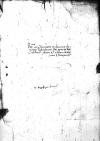Letter #105
Ioannes DANTISCUS to Tiedemann GIESEHeilsberg (Lidzbark), 15[40]-08-23
English register:
Dantiscus informs Giese that he had anticipated Alexander’s [Sculteti] negative reaction to the articuli [proposing an agreement] that were sent to him. Without expecting an agreement, Dantiscus expresses the view that the King [Sigismund I Jagiellon] should not be advised to prolong Alexander’s security. However, to avoid accusations of acting out of anger or bitterness, Dantiscus intends to send the articuli to the [Ermland] Chapter and notify the addressee of any joint arrangements they make.
Dantiscus declares that he will not oppose Alexander’s departure to Wrocław (Breslau). He would even consent to his traveling to Rome or as far as the Antipodes. However, Alexander has sent Gregorius Krendnerus to Rome to obtain permission to use income from the diocese of Ermland, despite the clear provisions of the Chapter’s statutes.
The matter of the [agreement] seems lost to Dantiscus; however, he believes that if Alexander were to come to his senses, he would win everyone's admiration.
Dantiscus recalls a previous request from Giese to send him a copy of the royal letter addressed to the abbots. The matter is being handled by Achatius von Zehmen, who visited Dantiscus in Heilsberg on August 18.
The King of Hungary [John I Zápolya] has been stricken with apoplexy and is not expected to recover, which may explain why King Sigismund I Jagiellon is reportedly suffering from severe shoulder pain. Queen Bona is also said to be unwell. Dantiscus encloses a letter from the Bishop of Włocławek [Łukasz Górka] containing additional news.
| received [1540]-08-25 Manuscript sources:
| ||||
Text & apparatus & commentary Plain text Text & commentary Text & apparatus Excerpts concerning Dantiscus' travels
Reverendissimo in Christo Patri et Domino, domino
Reverendissime in Christo Pater, domine frater et amice carissime et honoran(de) or honoran(dissime)⌈honoran(de)honoran(de) or honoran(dissime)⌉.
Salutem et fraternam commendationem.
Gravem tolerationem domino
Porro quod
Ceterum memini, quod superioribus cf.
Nova, quae iis diebus accepi, mitto. Quae remitti peto. Existimo iam notum esse Dominationi Vestrae Reverendissimae serenissimum
Dat(ae) or Dat(um)⌈Dat(ae)Dat(ae) or Dat(um)⌉
Reverendissimae Dominationis Vestrae frater integerrimus


 BCz 1596, p. 510
BCz 1596, p. 510